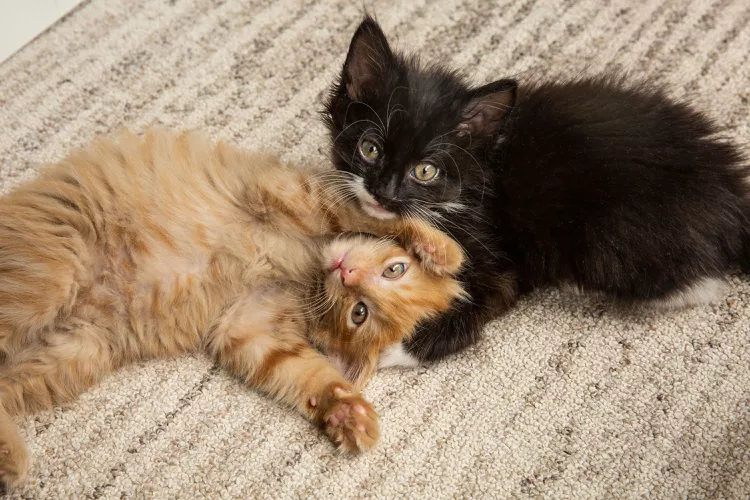- 01 of 08
They’ll Mentally Stimulate (And Entertain!) Each Other
Despite the stereotypes of loner kitties, cats aren’t totally independent, solitary animals. When they’re left alone for too long, they can become bored and lonely, which can lead to “acting out” with bad behaviors. Better negative attention than no attention, right? That’s why it’s vital to keep your cat stimulated and entertained, especially if you work outside the home or have a super busy schedule.
Adopting two kittens at the same time will ensure your kitties always have company—and a reliable source of entertainment. While you check off your to-do list, they’ll play, cuddle, and snooze the day away.
Want to ensure your kittens will not only entertain each other, but will also get along? Look for kittens from the same litter or a pair that bonded during their time in the animal shelter.
Continue to 2 of 8 below - 02 of 08
It Makes Training Way Easier
You know the saying “monkey see, monkey do?" When you’re training a kitten, it’s really “kitten see, kitten do.” Kittens learn good behaviors—like using the litter box, grooming, and not nipping or scratching—by watching other cats.
Accordingly, if one kitten quickly learns her good behaviors, the other is likely to follow suit—much faster than she would’ve learned on her own.
Continue to 3 of 8 below - 03 of 08
They’ll Keep Each Other Exercised and Active
Kittens burn off their excess energy in a number of ways. Some of those ways are hilarious—like when he randomly leaps into the air. But other ways aren’t so hilarious—like when she chews or scratches your furniture. It’s important to keep kittens active and engaged to avoid these types of bad behaviors, but even the most dedicated kitty parent may not have hours and hours to dedicate to playtime.
That’s where a second kitten comes in. Playtime between two kittens will keep them exercised, active, and mentally stimulated, so you can sit back, relax, and enjoy the kitty antics.
Continue to 4 of 8 below - 04 of 08
It’ll Help Prevent Food Pickiness
A picky eater can be extremely frustrating—and if she refuses to eat for a few days in a row, pickiness can be a little scary, too. Oftentimes, however, a picky kitty’s curiosity will overcome her distaste for a particular food. Meaning, if she sees her sister eating something, she’ll probably want to eat it, too.
Continue to 5 of 8 below - 05 of 08
One Kitten May Drive Your Older Cat Bananas
Believe it or not, if you already have a mature cat, two kittens are better than one. Why? A new kitten will see your older cat as a playmate—whether she likes it or not—and could become a nuisance to her or, worse, cause her stress and anxiety. If you adopt two kittens, however, they’ll play with each other, leaving your older cat to spectate in peace.
Continue to 6 of 8 below - 06 of 08
They’ll Groom Each Other
The key to a squeaky clean kitten? Another kitten! Although cats do a pretty good job of keeping themselves clean with self-grooming techniques, a brother or sister can help them get those hard-to-reach areas. Your duo might even develop a regular grooming routine after mealtime or playtime.
Continue to 7 of 8 below - 07 of 08
You’ll Save Another Life
One of the strongest arguments for adopting two cats, rather than one, is simple: If you adopt two cats, you’re saving two lives.
Despite the fact that kittens are more likely to be adopted, not every kitten finds her fur-ever home right away. In fact, if you visit your local animal shelter, many of the mature cats you see probably entered the shelter as kittens, but, for whatever reason, weren’t adopted. Accordingly, finding homes for litters of kittens shortly after they enter the shelter has a few major benefits:
- It prevents kittens and cats from living their entire lives in the shelter.
- If kittens aren’t available for adoption, older cats have a better chance of being adopted.
- Adopting out available kittens and cats creates more space for the shelter to bring in other animals-in-need
Continue to 8 of 8 below - 08 of 08
Adopting Two Doesn’t Cost Much More Than Adopting One
Yup, you can double your cuteness and fun without doubling your finances. Aside from kitten immunizations and deworming, adopting two kittens at the same time doesn’t cost much more than adopting one. (And if your animal shelter is putting up a pair of kittens for adoption, they may offer a discount on those treatments.)
Kittens can share many of their supplies—including litter boxes (Remember: it’s recommended that cat owners keep two litter boxes for one cat; three litter boxes for two cats; and so on), food and water dishes, toys, beds, and more.




















